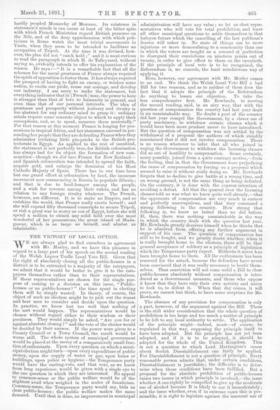M. DE TALLEYRAND ON FRENCH COLONISA- T HERE is not much
evidence of statesmanship in that part of the Memoirs of Talleyrand which the Due de Broglie has just given to the world, but there is some, and in particular there are a few pages on. the true Colonial policy for France which deserve the attention of every politician. They will gather from them, we think, if they read carefully, that M. de Talleyrand, nearly ninety years ago, and while he was still a young man, had thought out a Colonial policy for France which, if it had only been steadily pursued, would by this time have given her a magnificent Empire, and perhaps have materially modified her position in the commercial world. He desired for her "ships, Colonies, and. commerce" as much as Napoleon did, but looked for them all within the limits, as he says, of the ancient world. He was clearly of opinion that his country, in seeking Colonies all over the planet—in North America, as Louis XIV. did, in India, as Louis XV. did, in the Pacific, as Louis XVI. did, and in the West Indies, as Napoleon did—was throwing away strength, especially as England would always be the stronger Power upon the broad ocean. Competition with her there only ended, he thought, in multiplying occasions for sterile conflict, and he proposed deliberately to leave her unchecked in her expansion beyond seas, and to concentrate the whole resources of France steadily on the work of monopolising trade and influence throughout the Mediterranean, in- cluding in that term Egypt and Abyssinia, and in colonising the northern shore of Africa, in which he believed—no doubt with good. warrant from ancient history—that room for great populations and the means of creating great trades might easily be found. He would, to begin with, have utilised the French army which was withdrawn from Egypt after Napoleon's defeat there, and. wasted in a futile effort to reconquer St. Domingo, in a deliberate conquest and. settle- ment of "the Barbary States," in which term he included, we fancy, not only Algiers, but also Tunis and. Morocco. He riot only held these States to be such a nuisance to the civilised world that he inserted a plan for their subjugation into a forgotten clause of the Treaty of Amiens, but he maintained that they would. make more valuable Colonies for a Power geographically situated like France than any transmarine settlements could do. They would be easily defended, for France, though weaker than England on the ocean, could become stronger in the Mediterranean ; and. they were naturally rich both in land. and in supplies of labour. Slavery, he said, must be given up as an infamous traffic ; but in Africa there was an abundant supply of free labour, and, he adds, his ideas evidently expanding as his thoughts solidified themselves :—" All the products of Africa are good. The sugar of Egypt is hard and. grained ; in the process of refining it becomes as white as that of San Domingo ; and. there is every reason to believe that we could obtain a very fine quality in the central parts of the regencies of Tunis and of Algiers. Abyssinia pro- duces coffee which is superior to that of the West Indies ; if its culture were encouraged by an assured sale, all the kingdoms and islands of Southern Asia would furnish it in abundance. The beauty of the cotton cultivated in Africa merely for local needs, proves that it would easily surpass that of Cayenne, of our other Colonies, and. of the United States of America. Indigo is cultivated successfully between the 34th and 35th degrees of latitude, and could be easily obtained in this latitude in Africa." It might be possible even, he adds, obviously at a much later period, to turn the great stream of emigration now pouring from Europe into America, towards North Africa, and so affect the whole history of the world. The prescience of this policy is extraordinary. There is hardly a doubt, when we read it by the history of subsequent events, that had it been adopted when its author conceived. it—that is, before the Peace of Amiens—and carried out steadily for seventy years, it would by this time have been nearly or completely successful. It is very doubtful whether England would have really exerted. herself for twenty years to save even Egypt, which she only defended because she knew that General Bonaparte had. opened communications with "Citizen Tippoo," and was contem- plating an invasion of India from his basis on the Nile. Egypt was not then the gate of India, steam had not been utilised, and there was no thought, except among a few dreamers, of cutting the Suez Canal. For the rest, most of the project has actually been accomplished, and it could then have been accomplished far more easily, and on a far wider scale. England did not fight to prevent the conquest of Algiers, or the occupation of Tunis, and would not fight if the French attempted to add Tripoli, as far as Barca, to their dominions. Italy, at the time when Talleyrand thought out his plan, was not in existence as a whole, and its divisions were in politics a negligeable quantity ; while Spain was in the last depths of decrepitude, and though, as she subsequently showed, she was able, with the aid of her gridiron formation, to embarrass and consume great armies of invaders, she was wholly unable either to threaten France by land, or to wage a great defen- sive war across the Mediterranean. With fifty thou- sand men steadily employed and wasted, as Napoleon wasted life, France might have acquired without great risk the whole of Northern Africa from Fez to Syria, one of the most magnificent sub-tropical Empires to be carved out on the surface of the world. Moreover, if she had resolved. to use this Empire, as Talleyrand steadily advised, as a field for industry, instead of a mere territory, she might have filled it, either with blacks enticed from the interior by good treatment, or with the surplus population of Southern Europe, which even now drips slowly into French Africa, and which, if carefully encouraged by freedom from con- scription, grants of cheap land, plenty of light railways, and subsidised steamers to European ports, would prefer North Africa to Brazil, the United States, or the Argentine Republic.
The idea was a magnificent one, and it is difficult for any one who studies the modern policy of France in the Mediterranean, to doubt that it remained among the traditions of the French Foreign Office, and penetrated. the minds of a certain portion of the French "directing classes" who are always trying to act on it, to the annoy- ance of England, which now looks on Egypt as a man looks on his park-road; the irritation of Italy, which wants room for her overspill of population ; and the despair of Spain, which can hardly endure to forego her last chance of wide expansion, the absorption of the hardly peopled Monarchy of Morocco. Its existence in statesmen's minds is one cause at least of the bitter spite with which French Ministries regard British presence on the Nile, and of the deep apprehension with which poli- ticians in Rome watch the most trivial movements in Tunis, when they seem to be intended to facilitate an occupation of Tripoli. At the time it was devised, how- ever, the plan did not "catch hold ;" and it is most curious to read the paragraph in which M. de Talleyrand, without saying so, evidently intends to offer his explanation of the reason. He says :—" It is a remarkable fact that all the schemes for the naval greatness of France always required the spirit of opposition to foster them. It has always required the prospect of having to fight an enemy, or weaken some nation, to excite our pride, rouse our courage, and develop our industry. I am sorry to make the statement, but everything indicates that in [French] man, the power to hate is stronger than that of love to humanity in general, and even than that of our personal interests. The idea of greatness and prosperity without jealousy and rivalry is too abstract for any ordinary mind to grasp it : ordinary minds require some concrete object to which to apply their conceptions, and, so to speak, measure them materially." For that reason at this moment France is longing for pos- sessions in tropical Africa, and heestatesmen succeed in per- suading her people that they are defending France when they administer irritating little pin-pricks to the British pro- tectorate in Egypt. As applied to the rest of mankind, the statement is not perfectly true, for British colonisation has always had for its object the formation of new com- munities—though we did race France for New Zealand— and Spanish colonisation was intended to spread the faith, acquire gold, and enlarge the dominion of his Most Catholic Majesty of Spain. There has in our time been but one grand effort at colonisation by land, the immense movement now commencing in Russia to populate Siberia ; and that is due to land-hunger among the people, and a wish for revenue among their rulers, and has no relation to any foreign rivalry whatever. The French, however, are different. It is to make an Empire, and so outshine the world, that France really exerts herself ; and she will expend fifty thousand conscripts to secure Tripoli, or risk a great war to worry us out of Egypt, before she will spend a million to obtain any solid hold over the most wonderful of her possessions, the great island of Mada- gascar, which is as large as herself, and almost as inhabitable.



































 Previous page
Previous page